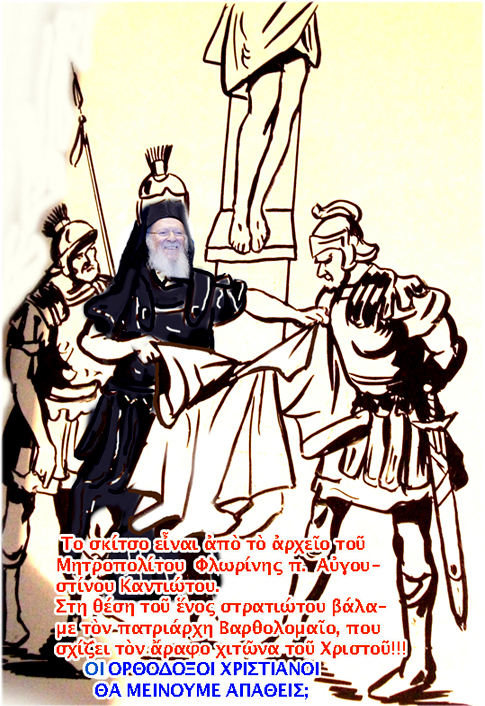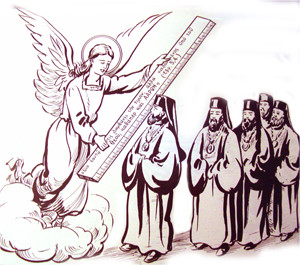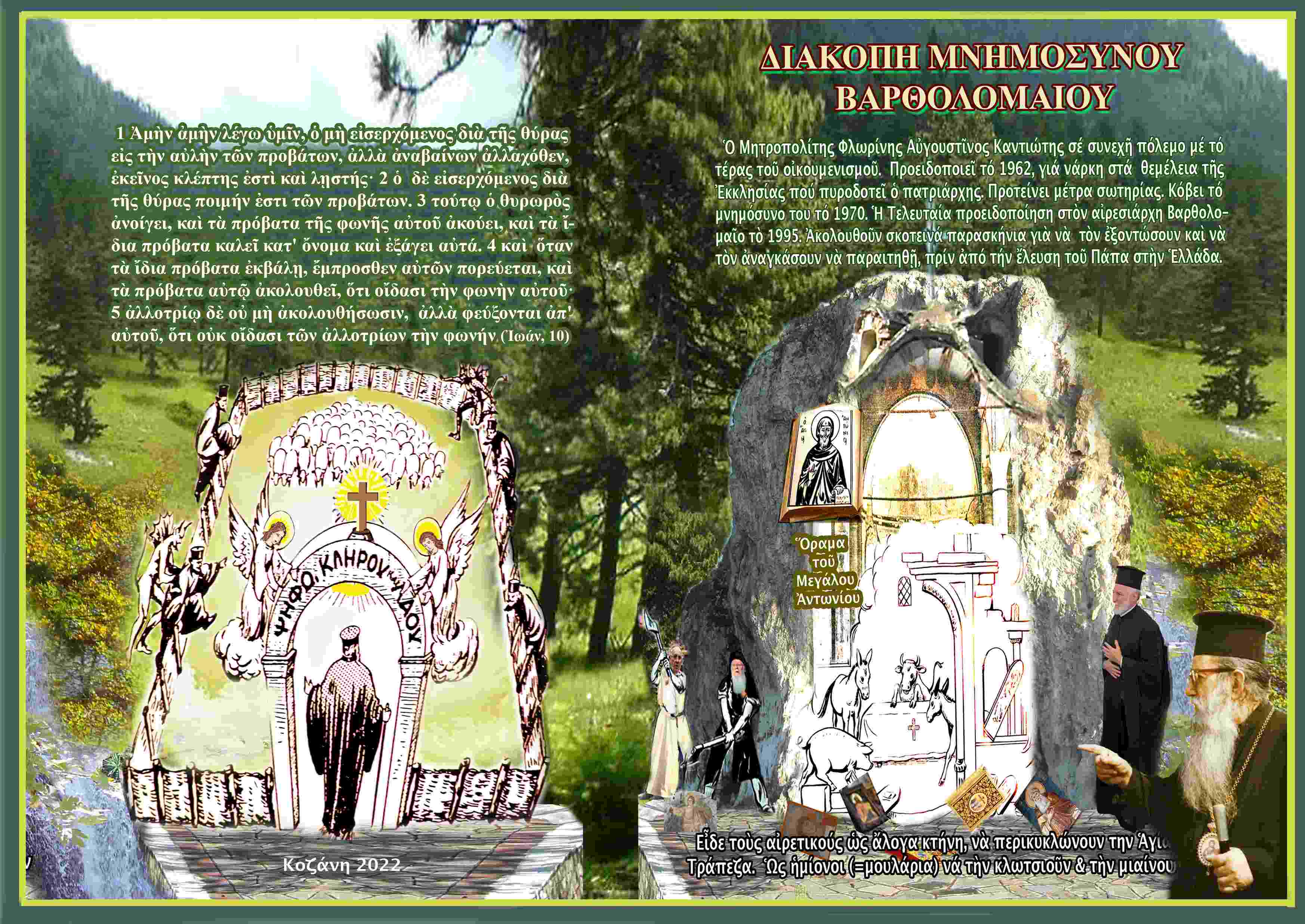ΣΥΝΤΕΛΕΙΤΑΙ ΠΡΟΔΟΣΙΑ ΤΗΣ ΟΡΘΟΔΟΞΟΥ ΠΙΣΤΕΩΣ
ΕΙΘΕ Ο ΚΥΡΙΟΣ ΝΑ ΑΝΑΣΤΗΣΗ ΝΕΟΥΣ ΑΓΩΝΙΣΤΑΣ
 Τοῦ Μητροπολίτου Φλωρίνης Αὐγουστίνου
Τοῦ Μητροπολίτου Φλωρίνης Αὐγουστίνου
Ζούμε είς ημέρας κατά τάς οποίας συντελείται, όπως ανέπτυξα είς τα εσπερινά κηρύγματα και είς τάς ποικίλας συναντήσεις τάς οποίας κάνουμε μεταξύ μας, συντελείται μία προδοσία της Ορθοδόξου ημών πίστεως μέσα είς τους κόλπους της Εκκλησίας έκ μέρους επισκόπων, έκ μέρους ιεροκήρυκων, έκ μέρους θεολόγων, έκ μέρους εκείνων οι οποίοι θα έπρεπε να είναι οι πρώτοι φύλακες της ιεράς ημών παρακαταθήκης.
Να είμεθα έν επιφυλακή. Και εάν παραστεί ανάγκη σκληρότερων αγώνων, να τους διεξάγωμε , διότι τώρα είναι απλώς τα προοίμια μίας τοιαύτης συγκρούσεως εάν παρουσιαστεί ανάγκη-δεν ξέρουμε τι μας επιφυλάσσει ο Κύριος-, εάν παρουσιαστεί τοιαύτη περίπτωσις, είθε ο Κύριος να αναστήσει νέους αγωνιστάς της Ορθοδόξου ημών πίστεως.
Καθένας από μας και ιδίως σείς οι νεαρώτεροι, άς προσπαθήσετε να γίνεται μικροί Αθανάσιοι, μικροί Φώτιοι, μικροί Μάρκοι Ευγενικοί, έτοιμοι να σηκώσετε ψηλά την σημαίαν και το λάβαρο της Ορθοδόξου μας πίστεως.
* * *
Kyriaki – Sunday Sermonette
Issue No. 1851
The Necessity Of The Moral (Canon) Law
The memory of the holy fathers, which we are celebrating, and certain co nventions which are taking place as of late by theologians with the disposition of undervaluing so much the holy fathers (“metapatristic” theology) as much, also, the sacred canons (“codification”), give us the opportunity to remind ourselves again certain teachings of father Augustinos with diachronic timeliness.
nventions which are taking place as of late by theologians with the disposition of undervaluing so much the holy fathers (“metapatristic” theology) as much, also, the sacred canons (“codification”), give us the opportunity to remind ourselves again certain teachings of father Augustinos with diachronic timeliness.
A few years ago, my beloved, there was an attempt made to write off from the (Hellenic) Constitution and the bylaws of the Church the sacred canons which were compiled by the holy fathers with the breath of the holy Spirit for the governance of the Church.
This expulsion evoked, as was natural, the indignation of every orthodox Christian, and there were heard even on the part of hierarchs robust voices of protest.
The sacred canons are indissolubly connected with the god-bearing fathers, just as rivers with their sources. Either you accept the sacred canons and with them you also accept the fathers, or you reject the canons and together with them also reject the fathers of the Church. The “out with the canons” is identifiable with the saying “out with the fathers”. Whoever honors the canons also honors the fathers and whoever dishonors the canons also dishonors the fathers. How true this is, is proved by the fact that those clerics and lay-people who are followers of ecumenism, in trying to shake the validity of the sacred canons, speak overtly or covertly even about the fathers with disdain.
Out with the sacred canons, out with the divine fathers, whose writings are nothing but the development of those brief propositions concerning ecclesiastical morality and good order or orderliness, which they formulated in ecumenical and regional Synods, so that they may be understood easily and be applied by all. Long live, then, the spirit of the flesh, which has the shamelessness to judge rationalistically and to spurn and insult the holy Spirit! But before we see the insults against the sacred canons, let’s speak about the necessity of the moral law which the sacred canons express.
According to orthodox teaching man came out of the hands of the Creator as a superb creation, only a little inferior to the angels, since he bore flesh, with a pure soul. In his clear psychical world God was mirrored, who communicated with him directly. The moral law was unwritten, imprinted robustly in his conscience.
But unfortunately man sinned and fell. The clarity of his conscience became clouded. No longer was the voice of God heard in his conscience clearly. And the more time and the generations passed and corruption increased, that much the voice of conscience weakened and sometimes it stopped being heard.
If man had not fallen and God continued to speak to him by means of his conscience, the written divine law would not have been necessary. But since he fell and the unwritten moral law in him lost its tone, God gave him the written law also, to remind him vividly of the unwritten law. Thus was given through Moses at Mount Sinai the written divine law, engraved on stone plates, and it was written more extensively in the god-inspired books of Leviticus and Deuteronomy.
The Mosaic law did not cease being a reminder to the people of God through the prophets and to constitute a moral damn. And when in times of corruption the moral damn would be abolished and the people ended up in moral immunity, the consequences were fearful. The people were an untamed horse which breaks the bridle and surges towards the cliff.
Man had ended up becoming a slave of sin. This law was good and holy, but it didn’t have the power to free him. Through it man simply would remember what God’s will is and through the transgression he would receive the experience of how much power sin has. For this reason man needed a great power, help from God, in order to set free from the power of sin.
And this power was given him through our Lord Jesus Christ. With this power, which is called divine grace, man succeeded not only to shake off the domination of sin but also to be raised up to the highest heights of the moral law, which are the commandments of the New Testament. Thus there began to be developed a new life, spiritual, having as prototype the Lord of glory. “He who says he remains in Him ought to walk as He walked” (1 John 2:6).
The Christian life is a path, a road, the road of Golgotha, the road of the cross. Christian ought to tread on this path. This means that he must not remain at a standstill. Christianity is not standing still and inertia, it is constant movement and progress, progress however upon the same road, which the God-man circumscribed. Neither stationary, but neither deviating to the right or to the left from the royal mean, the only secure path to reach the heavenly fatherland.
This path, however, is not easy, it has harrowing adventures and dangers. For this reason the Christian has need of vigilant caution but also guidance, so as not to lose the path and err or wander. And just as in the public roads there exist signposts which indicate the right path, thus also here there exist bright indicators which draw the attention to dangers, guard and direct correctly. The commandment is god-inspired: “See exactly how you walk, not as unwise, but as wise…” (Eph. 5.15).
Bright indicators upon the Christian pathway are the sacred canons. Let us thank the Lord, because not only has he revealed the path of salvation, but also because with His constant care He ordained as guides in our path the fathers of the Church and he enlightened them to compile the sacred canons as indicators of a safe journey. And just as he who removes or destroys signposts on the road commits a crime, because he makes the traffic dangerous and becomes a moral perpetrator of fearful accidents, so also and in like manner whoever dares to subtract or abolish the sacred canons commits a crime against the salvation of souls.
In brief by way of summarizing we say, that the sacred canons are sacred mottos, which express the moral teaching of the Church and offer answers to the ones journeying on the Christian path who find themselves before various difficulties and obstacles.
The contemporary carnal spirit fights against the sacred canons. It speaks about many of them as if it is concerning anachronistic ordinances, excessively old, not capable of being applied, insane, and the supporters of the sacred canons it characterizes as “dark agers” (i.e., Medievalists).
Some advanced to a distinction of canons: they separate them into dogmatic – worshipful and into moral. And from the collective whole of the 863 sacred canons of the Church, they only consider 53 of them as dogmatic and they consider those worthy of respect, the others not.
This distinction is groundless. Dogmatic canons do not exist. What is to be believed (pisteftea), that is, the dogmas, were formulated by the ecumenical Synods in brief propositions which are called terms, while the things that are to be done (practea), that is, morality, were formulated in propositions which are called canons. A few canons which ordain or determine our stance before heretics can not for this reason be characterized as being dogmatic; they simply have dogmatic color. This distinction occurs either because of superficiality or from some motive, to weaken and cut away the large part of the canons and to deaden thus the moral life.
The Christian life is imaged as an eagle with large wings. For it to fly it has need of both wings, faith and morality. Dogma and morality are unbreakably connected. The brother of our Lord Iakovos says: “Faith, without works, is dead in and of itself…you have faith, and I have works; show me your faith from your works, and from my works I will show you my faith” (James 2:17-18).
The faith is understood as a canon – rule – of life, not as some theoretical manufactured product. If it is not applied everywhere in life and does not sprinkle, it is a dried up Christianity, a dead Christianity, destined only of the museum and archeologists. That’s where it will end up, if the sacred canons are abolished, which expound and apply in different cases the Gospel or Evangelical law.
Rivers don’t separate from their fountain-springs and fountain-springs don’t separate from their rivers. Thus also dogmas can not be separated from the sacred canons and the sacred canons from dogmas.
+ bishop Augustinos
 Τοῦ Μητροπολίτου Φλωρίνης Αὐγουστίνου
Τοῦ Μητροπολίτου Φλωρίνης Αὐγουστίνου
 Ιούλ 17th, 2016 |
Ιούλ 17th, 2016 |  Filed under:
Filed under: 

Add A Comment
You must be logged in to post a comment.